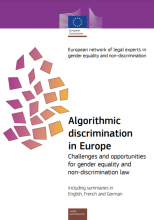
Belgium
The rapid development and increasing use of artificial intelligence and algorithmic applications have raised many concerns relating to algorithms’ propensity to discriminate. Algorithmic discrimination can arise from various sources and at various stages of software design and it risks endangering one of the most fundamental rights guaranteed by EU law: the right to gender equality and non-discrimination. This thematic report identifies the main legal challenges arising from algorithmic discrimination at both national and EU level, covering the EU-27, the EEA countries and the United Kingdom. It assesses whether the current gender equality and non-discrimination legislative framework in place in the EU and at the national level adequately captures algorithmic discrimination. It maps out the gaps and weaknesses that arise from the interaction between the specific types of discrimination produced by algorithmic decision-making systems on the one hand and the particular material and personal scope of existing legislative frameworks on the other. This thematic report also examines which legal solutions, policy measures and good practices the EU and the national member states have adopted to address these gaps and weaknesses. In short, this thematic report investigates how the issue of algorithmic discrimination is framed, addressed and redressed in the EU, with a particular focus on gender equality.